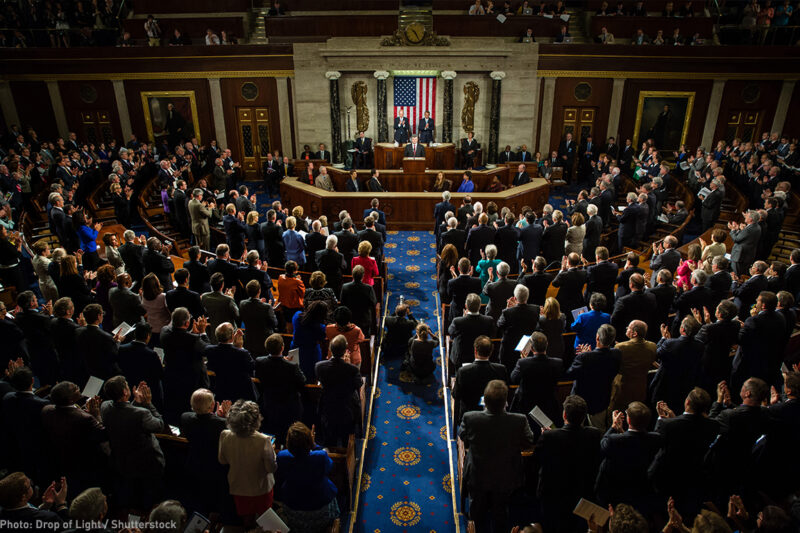Congress Is Poised to Give Trump Administration Powerful New Spying Powers


The Trump administration wants more spying power — and Congress appears poised to give it to them.
Touting national security to justify spying powers that jeopardize our constitutional rights is a strategy that we have seen before. It happened with the Patriot Act after 9/11, and members of Congress and government officials are now employing similar arguments again. This time it involves a drone bill that some in Congress are to be sneakily inserted into a larger piece of legislation that could be considered this month.
According to , members of Congress are lobbying to add to the Federal Aviation Agency Reauthorization Act. Proponents of the bill claim that it will make our country safer. But, in reality, the drone legislation will give new surveillance powers to the Trump administration to spy on journalists, activists, and other Americans without a warrant.
, the bill’s intent is to arm the “Department of Homeland Security and the Justice Department with the ability to act quickly and effectively when a drone poses a risk to large-scale events and government facilities.” This goal may be admirable, but the bill does not achieve it.
Instead, the bill empowers these agencies to warrantlessly spy on Americans without complying with existing US laws — including , , and . Generally, these laws require the government to get a warrant if they want to wiretap or access other types of stored communications.
The drone bill, however, exempts DHS and DOJ from these restrictions anytime it deems a drone a “threat” to certain covered areas. The bill defined covered areas so broadly — including areas where there may be emergency responses or federal investigations— that it will inevitably sweep in areas where media organizations have a legitimate interest in reporting.
As we have noted before, this surveillance could ultimately sweep in communications of media organizations using drones to report on disaster areas or seeking to uncover details of children being held in . It can also include information about private companies or even just drone hobbyists.
Indeed, in a June hearing, a DHS representative admitted that surveillance was a benefit of the bill. In response to questioning, David Glawe, undersecretary for the Office of Intelligence and Analysis, that using drones “for law enforcement purposes to conduct surveillance on criminal suspects, terrorist, foreign intelligence is going to be an absolute benefit in how we develop these powers and procedures.”
The bill also authorizes more than just collection of communications and other information from drones. It will also likely be interpreted to allow the agencies to hack or interfere with radio signals, without any court approval. While the agency has not specified what “counter drone” surveillance techniques it intends to purchase, we know that companies are products that can hijack drones, jam signals within a given area, and more.
Jamming of signals could impact the ability of individuals on the ground to use WiFi or cellular networks, jeopardizing public safety by limiting the ability of hospitals, first responders, and other medical professionals to function. Similarly, there is no guarantee that the government only hacks drones that are in fact malicious or that efforts to hijack a drone do not result in unintended consequences.
These risks are precisely why in July 2018 the FAA itself to several stating that counter-drone technology was not ready for use in civil airports given the dangers it poses. Among other things, the letter noted that this technology has “safety implications,” including the risk of “false positives.” As a result, the technology could create greater “hazards” than it intends to mitigate. Despite these warnings, the proposed drone bill would give DHS and DOJ virtually carte blanche to use these counter-drone techniques without any judicial oversight or sufficient civil remedies in cases where individuals are harmed.
Moreover, once collected, similar to other national security authorities, the bill creates a backdoor allowing this information to be used for purposes that have nothing to do with protecting individuals from drone threats. This sensitive and private information can be retained and used in broad circumstances, including supporting a “safety or security” function of DHS or DOJ. This could include general law enforcement, border security, or immigration enforcement.
Exempting the government from following existing laws is entirely unnecessary to protect against drones that may pose a threat to public safety. In cases where a true emergency exists, the Wiretap Act and other federal law generally allow the government to quickly intercept and gather information and only seek a warrant after-the-fact. This carefully balances the government’s need to gather information quickly in an emergency, with the judicial oversight that is necessary to ensure that the government doesn’t falsely claim an emergency to avoid the Constitution’s warrant requirement.

